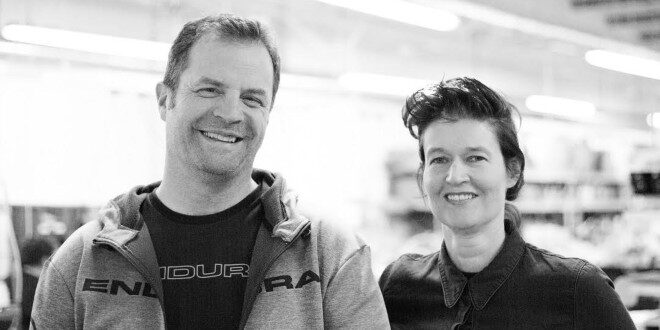Cycling is often at the centre of sustainable travel initiatives, with the effects of rising carbon emissions and climate change becoming increasingly worrying every day. But how green is the trade itself? BikeBiz speaks to six brands to find out what they’re doing to be more environmentally friendly. Today, we hear from Pamela Barclay and Jim McFarlane, Endura’s founders
The way we see it, from an environmental perspective there are two main issues and they regularly get confused. One is pollutants that degrade the environment so from an apparel perspective, that would be dye stuffs going into watercourses. The other issue is the climate emergency and urgently cutting down the CO2 emissions.
There are so many things that companies and individuals can do to reduce their footprint but not all have equal weight or positive impact and it is incredibly difficult to cut through to the points that really will make a difference. The narrative ends up conflated with superficial issues like plastic straws or paper cups when the most important in our opinion is urgently addressing the climate so that the world can stay under that 1.5dC global temp threshold and avoid catastrophic events unravelling. So Endura has focused on that… hence the Million Trees initiative.
Regarding pollutants, we increasingly use fabrics and methods that are certified as safe to the local environment in their manufacturing process particularly as mills’ infrastructure is moving towards that capacity.
The big long term infrastructure challenge of end-of-life remains unclear and it will take the global fashion industry to solve that one… whether moving to mono materials, mechanical or chemical recycling and how that is collected, sorted and processed back to virgin. There are also lots of nascent discoveries around natural enzymes that basically eat plastics, which is incredibly exciting but such early days.
One Million Trees
With global carbon emissions at an all-time high in 2019, it was both a breakthrough and an encouragingly simple solution when scientists announced that one of the cheapest and most effective ways of removing critical levels of carbon from the atmosphere is by planting trees across the world. Research from Swiss university ETH Zürich suggested that forest restoration isn’t just one of our climate change solutions, it’s overwhelmingly the top solution – as long as we act fast.
From 2020 onwards, we have committed to planting one million trees annually to help reduce the quantity of carbon in the atmosphere and we are on schedule (so far we have planted over 1.8 million trees). As a company that operates on a global level, we are very aware of our environmental impact and are working on a number of fronts to reduce our footprint. While we have been taking steps towards change around garment eco-credentials, longevity of product use and end-of-life, we believe there is one overriding challenge for the planet – which is climate change.
The one thing we must focus on now is the climate emergency. If we don’t tackle climate change then there will not be a planet to clean up.
What else is the company doing to reduce its environmental impact?
- All apparel fabrics being PFC free since 2018
- Having offered a crash repair service for over 15 years
- Offering bio-degradable garment proofers and cleansers
- Continuing to manufacture in Scotland
- We use lots of recycled fabrics across our range
- Fabrics that are ‘MadeKind’, meaning they have been manufactured in a way that is certified to avoid damage to the local environment
- Our garments have a reputation for durability and longevity.. not built-in-obsolescence
- 99% of our packaging being recyclable
- We offer a brand new polybag recycling scheme to our partner retailers, where they can return poly bags to us from Endura or our competitors for us to recycle
- We will be carbon negative by 2024 and during that process, we will be shifting our manufacturing bases over to renewable energy. That is where over 70% of our carbon emissions as a brand come from and it is very difficult to effect that kind of change offshore
- We want to have as much of our range converted to certified recycled and MadeKind yarns as possible
We are rapidly addressing our carbon footprint but on the end-of-life challenge that all manufacturers of all products have, there is not a clear solution yet. Biodegradability has been rather discredited as the conditions for it to be effective on apparel are so limited and unrealistic. But the ability to properly recycle fabrics back into virgin yarns either using bio enzymes, mechanical or chemical methods is an area of great activity, although there is not an obvious winner in that arena. If that could be cracked on a commercial scale then that would unlock the problem of landfill for many, many kinds.
 BikeBiz Bicycle and cycling retail news
BikeBiz Bicycle and cycling retail news




